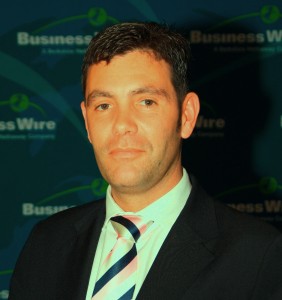Each week Emerging Markets ESG publishes an interview entitled, “Five Questions about SRI.” The interview features a practitioner’s insights about SRI in emerging markets and through Emerging Markets ESG shares this expertise with a wide global audience. The goals of Five Questions about SRI are fourfold:
- To reflect on what SRI in emerging markets means to practitioners;
- To collect a catalogue of examples of SRI in practice in emerging markets;
- To raise awareness about SRI in emerging markets; and
- To enable SRI practitioners in emerging markets to network with peers around the world.
This week’s interview is with Dick Bromley, Group Vice President, Europe, Middle East and Africa, Business Wire.
Business Wire, a Berkshire Hathaway company, is utilized by tens of thousands of member companies and organizations worldwide to communicate investor relations and public relations content to target audiences. Dick Bromley began his Business Wire career in London as UK sales manager in 2001 after working at hemscott.net, one of Britain’s leading online financial news providers. In 2006, he moved into the role of Business Wire’s European Sales Director and in 2008 was named Vice President, Europe. Bromley graduated from Huddersfield University, Huddersfield, UK, with a degree in history and politics.
Emerging Markets ESG: How would you define socially responsible investment (SRI)?
 Dick Bromley: We look at SRI from several perspectives. First and foremost, while Business Wire in and of itself is not a public company, we walk the walk and believe in the key tenants of SRI. Being a good corporate citizen is part of who we are. As a matter of fact, our founder has donated in excess of $400 million to charity and recently agreed to participate in The Giving Pledge.
Dick Bromley: We look at SRI from several perspectives. First and foremost, while Business Wire in and of itself is not a public company, we walk the walk and believe in the key tenants of SRI. Being a good corporate citizen is part of who we are. As a matter of fact, our founder has donated in excess of $400 million to charity and recently agreed to participate in The Giving Pledge.
From a much more macro perspective, we believe there in a correlation between social good and long-term profit, and in many instances believe CSR efforts by a public company should not be looked at as a burden, but instead could be a source of competitive advantage when judiciously undertaken.
Emerging Markets ESG: What distinguishes SRI from mainstream investment?
Dick Bromley: We believe the gap between mainstream and SRI investing is beginning to close. More and more companies are taking part in initiatives like the United Nations Global Compact and the sheer size of SRI capital speaks for itself.
According to our research, in 2007, mutual funds investing in socially conscious firms had assets of more than $2.5 trillion dollars in the U.S. and $2 trillion dollars in Europe. Socially conscious funds in the U.S., U.K., and Canada grew by $400 billion, $600 billion, and $400 billion, respectively, between 2001 and 2007. This big increase in dollars looking to invest in CSR-savvy companies has meant a corresponding growing interest in CSR as a value guide to directing those dollars. At the start of this year, professionally managed assets following SRI strategies in the U.S. added up to over $3 trillion dollars, a rise of more than 380 percent from 1995, when they were measured at $639 billion.
Emerging Markets ESG: Which extra-financial theme – environmental, social or governance – is the most challenging for EMEA emerging market companies to manage?
Dick Bromley: We believe the challenges vary by region, country, industry and stakeholders. For example, a mining outfit will face vastly different internal and external pressures than a brewery.
Emerging Markets ESG: Which extra-financial theme – environmental, social or governance – is the most challenging for investors in EMEA emerging markets to analyze?
Dick Bromley: Again, this is a difficult question to answer, it all depends what information is publicly disclosed by a company, and in many of the EMEA markets, this sort of information is not part of a mandated disclosure regime.
Therefore, the onus will be on the investor in these instances. The investor will need to look beyond the traditional financials and the environmental factors affecting the region, country, company, and its industry. Questions to ask would then be predicated on each company and its community and environmental awareness, treatment of employees, relationship with suppliers and vendors, customers and of course, investors.
Emerging Markets ESG: You have been with Business Wire for a decade. Which trends have you observed during this time period in ESG disclosures as part of the day-to-day investor relations and public relations programs of EMEA listed companies?
Dick Bromley: As stated earlier, we are beginning to see many of these issues become much more mainstream. At Business Wire we play a role by aiding in transparency, both via our traditional newswire services and our global Corporate Social Responsibility distribution.